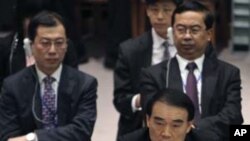China strongly defended its veto of a United Nations Security Council resolution on Syria again Monday, saying its decision was ultimately aimed at avoiding more casualties.
Monday's Foreign Ministry briefing was dominated by China's decision, along with Russia's, to block the resolution condemning Syria's crackdown on anti-government protesters and calling for President Bashar al-Assad to resign.
|
VOA’s Ira Mellman spoke about the Chinese veto with Clayton Dube, Executive Director of the US-China Institute at the University of Southern California. Dube said the move by Beijing follows “a well-established pattern of resisting calls for regime change.” |
Spokesman Liu Weimin said China has been actively involved in U.N. efforts to address the Syrian crisis, but sees the latest resolution as divisive and ineffective.
China vetoed the resolution, said Liu, because it feels that supporters pushed through the vote while different sides were still "seriously divided." Thirteen of the 15 council members voted in favor of the measure.
This kind of practice, Liu added, does not help maintain unity within the U.N. Security Council nor does it solve the Syrian issue. Liu went on to say China is paying close attention to the situation in Syria and is calling on all sides there to stop violence. Beijing's ultimate goal, he said, is to avoid casualties of innocent civilians and restore normal order in Syria.
The spokesman did not directly respond to questions for comment about the rising death toll in Syria, where the opposition accuses government troops of regular attacks in the Syrian city, Homs.
He also rejected Secretary of State Hillary Clinton's description of the Chinese and Russian vetoes as “a travesty.”
Liu said China does not accept the accusation, adding that China is not trying to favor any side in Syria's civil conflict. China sees itself as “a responsible major country,” and will continue to work with the international community for a positive outcome, Lui said.
Sun Zhe, international studies professor at Tsinghua University, believes there is still still room to negotiate stronger international action on Syria. If the situation deteriorates even further, China and Russia could still change their positions, said Sun, arguing that Western countries that are calling for sanctions should continue their discussions.
China is following Russia's lead on the Syria issue, but Sun acknowledged that Beijing also has its own concerns. Chinese leaders see the Syrian government's actions as “extremist,” he said, but are afraid of Western intervention because, they do not want to see another Libya or another Egypt.
Russia's foreign minister is due in Syria on Tuesday. The Chinese spokesman said he had no information as to whether Chinese officials would be heading to Damascus anytime in the immediate future.




